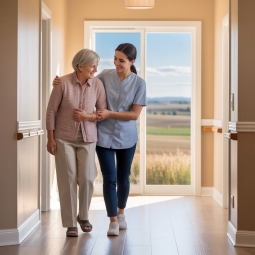
Supportive Living Regulation in Alberta
- Government
- by SeniorCareAccess
- connect@lifestyle55plusnetwork.com
This article was originally published on 5/1/2021 and reflects the information available at that time. While it still provides valuable insights, we've created a new and updated article on this topic to provide more current and engaging content. You can find the latest version at Supportive Living in Alberta: Regulations, Levels, and How to Choose the Right Option.
Alberta is one of 8 provinces in Canada currently that has some form of legislation to protect seniors who reside in “Supportive Living Facilities”. These Accommodation Standards have been in place since April 2007 and are maintained and enforced through the provincial government department called “Alberta Seniors and Community Supports”.
Alberta has both public and private ‘supportive living’ settings that are impacted by these standards. The government has created a “Supportive Living Framework” that defines what type of homes are included in this definition.
What is the definition of Supportive Living in Alberta?
A supportive living setting is housing/residential setting that combines encourages and supports independence with the provision of care & support as required. Usually, the environment also contains amenities that offer safety and security while meeting the needs of the residents. The definition is broad enough to include adults with disabilities as well as seniors who require some support. There are limits to this kind of care though and facilities providing services to care for those with complex needs fall into a different category and as such, different regulations. Generally, supportive living residences offer “health and wellness” as well as “hospitality” services which encompass things such as meals, housekeeping, laundry, social and recreational services, etc.
Supportive living encompasses 4 different levels (Residential Living, Lodging Living, Assisted Living & Enhanced Living). Beyond this is “facility living” which is governed by other legislation.
For further details on what Supportive Living entails you can visit
https://open.alberta.ca/publications/9780778584100.
The Accommodation Standards for Supportive Living in Alberta are mandatory for all settings with 4 or more residents and cover 8 distinct areas with several standards within each category.
- Physical Environment (including fire regulations, maintenance, heating & ventilation)
- Hospitality Services (food, housekeeping, laundry, etc.)
- Safety Services (abuse prevention, emergency preparedness, etc.)
- Personal Services (social leisure, medications, optional services, etc.)
- Coordination and Referral Services
- Residential Services
- Human Resources (employee standards and screening)
- Management and Administration
For further information on these standards and what they encompass you can view an archived version of the Supportive Living Standards and Checklist.
In addition to these provincial standards, residences are also expected to follow several other regulations set out by municipalities as well as other applicable provincial and federal standards related to the health and safety of their residents and proper business practices of themselves and those they employ.
Information obtained from: www.alberta.ca & www.albertahealthservices.ca
________________________
If you are looking for assistance locating a home or resources for your loved one, you can reach out to our consulting team at consulting@lifestyle55plusnetwork.com or visit our consulting page for more information. If you need more information on care options for seniors, retirement community, or long-term care visiting tips please visit our article library for topics of interest.
SeniorCareAccess.com is Canada’s largest unbiased seniors’ housing database, offering consulting services, and both seniors’ service and housing directories for professionals, seniors, and their families.